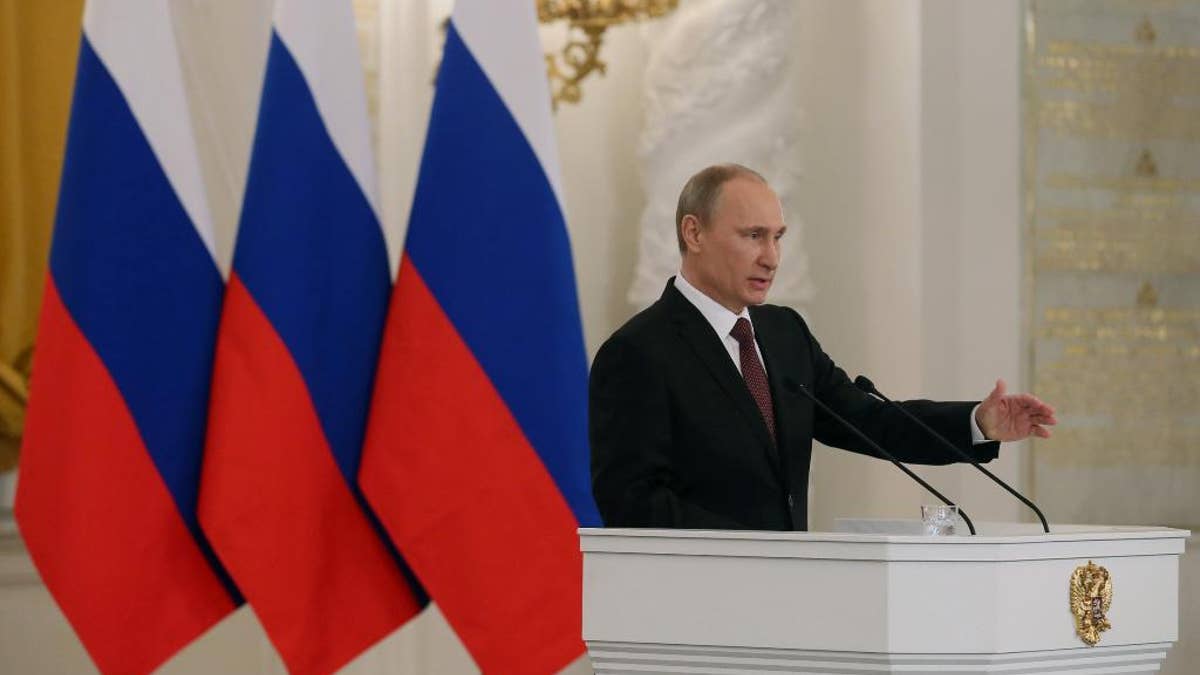
Russia's President Vladimir Putin addresses the Federation Council in Moscow's Kremlin on Tuesday, March 18, 2014. President Vladimir Putin defended Russia’s move to annex Crimea, saying that the rights of ethnic Russians have been abused by the Ukrainian government. He pointed at the example of Kosovo’s independence bid supported by the West, and said that Crimea’s secession from Ukraine repeated Ukraine’s own secession from the Soviet Union in 1991. (AP Photo/Sergei Ilnitsky, pool) (The Associated Press)
MOSCOW – Russian President Vladimir Putin made his case for taking Crimea back from Ukraine and explained his decision to defy the West despite the threat of sanctions. He also spoke to concerns that Russia will move into other regions of Ukraine as well. Here are excerpts of Tuesday's 40-minute, anger-tinged speech, which drew enthusiastic applause from the hundreds of Russian parliament members and government officials seated before him in a grand Kremlin hall:
ON WHAT CRIMEA MEANS TO RUSSIA
"Everything in Crimea speaks of our shared history and pride."
"In people's hearts and minds, Crimea has always been an integral part of Russia. This firm conviction, based on truth and justice, was unshakeable and passed from generation to generation."
ON THE WEST'S RESPONSE TO RUSSIA'S TAKEOVER OF CRIMEA
"What do we hear from our colleagues in Western Europe and North America? They tell us that we are violating the norms of international law. First of all, it's good that they at least remember that international law exists, and thanks for that. Better late than never."
"We hear from the United States and Europe that Kosovo was again some kind of special case. But what then, in the opinion of our colleagues, makes it exceptional? It turns out that during the conflict in Kosovo there were many human victims. What is this? A judicial legal argument?"
ON THE WEST'S IGNORING OF RUSSIA'S INTERESTS
"They have constantly tried to drive us into a corner for our independent stance, for defending it, for calling things by their proper names and not being hypocritical. But there are limits. And in the case of Ukraine, our Western partners have crossed a line. They have behaved rudely, irresponsibly and unprofessionally."
"If you push a spring too hard, at some point it will spring back. You always need to remember this."
ON UKRAINE'S DESIRE TO JOIN NATO
"By the way, we don't have anything against cooperation with NATO, nothing at all. We are against having the military alliance ... behaving as the master of the house outside our fence, next to our home or on our historical territory. You know, I simply cannot imagine that we would go to Sevastopol as guests of NATO sailors. Most of them, by the way, are nice guys, but better for them to visit us as guests in Sevastopol than for us to visit them."
ON WESTERN SANCTIONS
"We have to decide for ourselves whether we are ready to stand up for our national interests or whether we will keep surrendering them, retreating who knows where. Some Western politicians even try to frighten us not only with sanctions but with the prospect of the exacerbation of domestic problems. I'd like to know what they have in mind: the actions of some kind of fifth column — all sorts of national traitors — or whether they think they can worsen the socio-economic situation in Russia and by doing so provoke discontent."
ON HOW CRIMEA AND OTHER LANDS ENDED UP IN UKRAINE
"After the (1917) revolution, the Bolsheviks, for various reasons - may God be their judge - added large sections of the historical south of Russia to the republic of Ukraine. This was done with no consideration for the ethnic composition of the people living there, and today these areas form the southeast of Ukraine. And in 1954 a decision followed on transferring Crimea as well."
"It was only when Crimea suddenly ended up in a different country (after the 1991 collapse of the Soviet Union) that Russia realized that it had not simply been robbed but plundered. ... Millions of Russians went to bed in one country and woke up in another, overnight becoming ethnic minorities in former Soviet republics, while the Russian nation became one of the biggest, if not the biggest, ethnic group in the world to be divided by borders."
"Now, many years later, I have heard residents of Crimea say that back in 1991 they were handed over like a sack of potatoes. This is hard to disagree with. And what about the Russian state? What about Russia? It lowered its head and accepted the situation, swallowing the insult. Our country was going through such hard times then that it simply was incapable of defending its interests. But people could not reconcile themselves to this flagrant historical injustice."
ON ANY FURTHER DIVISION OF UKRAINE
"Don't believe those who try to frighten you about Russia, who are shouting that other regions of Ukraine will follow Crimea. We don't want the division of Ukraine. We don't need this."
"Millions of Russian people, Russian-speaking citizens live and will live in Ukraine, and Russia will always defend their interests with political, diplomatic and legal means."




















